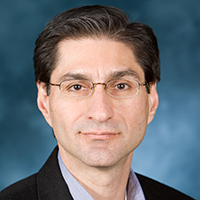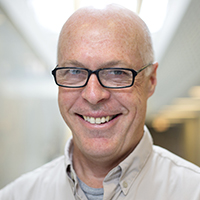2010 College of Engineering Awards
The recipients of 2010 College of Engineering Awards for Electrical Engineering and Computer Science are:
Jessy Grizzle
Stephen S. Attwood Award

 Enlarge
Enlarge
Jessy Grizzle, Jerry W. and Carol L. Levin Professor Engineering, is internationally recognized for his theoretical work on nonlinear control systems. He is performing path-breaking research in the feedback control of bipedal locomotion in machines using the robot MABEL; he is working with engineers at Ford Motor Company to reduce emissions and enhance fuel economy in HEVs; he invented a broadband RF sensor for use in plasma processing systems; and he is involved in a project to improve the regulation of blood glucose levels in ICU patients. Prof. Grizzle is devoted to his students, earning him a CoE Teaching Award, and a student-elected Engineering Professor of the Year award. He is co-author of the book, Feedback Control of Dynamic Bipedal Robot Locomotion. The Stephen S. Attwood Award is the highest faculty achievement award conferred by the College.
Amir Mortazawi
Service Excellence Award

 Enlarge
Enlarge
Amir Mortazawi has delivered exceptional service to his profession and to the ECE Division, especially as Chair of the EE Graduate Committee, as an undergraduate instructor, and as a graduate mentor. As EE graduate committee chair, he was committed to attracting top quality students, and during a five-year period under his leadership, saw the GPA of incoming graduate students rise significantly. Alumni still appreciate his helpfulness as graduate advisor for the applied electromagnetics and RF area. In addition to other significant service in the professional community, he serves as Editor-in-Chief of the major journal in his field, Transactions on Microwave Theory and Techniques.
Greg Wakefield
Service Excellence Award

 Enlarge
Enlarge
Greg Wakefield has shown remarkable leadership in two major service activities within the EECS Department. As Chair of the EECS Curriculum Committee, he established an efficient committee structure for all of the degree programs within the department during an important time of internal departmental restructuring. He also oversaw the most recent successful ABET accreditation process for all four degree programs. Greg has been praised for his valuable contributions to a wide variety of service activities, including the Arts of Earth activities, the CoE International Programs Committee, and the Faculty Grants and Awards Program with OVPR.
David Chesney
Thomas M. Sawyer, Jr. Teaching Award

 Enlarge
Enlarge
Dave Chesney has made significant and lasting contributions to teaching, curriculum development and outreach since joining U-M in 2001. In addition to his contributions as an engaging teacher in a variety of courses, his interest in social issues and broad approach to computing led him to develop or co-develop the courses: Gaming for the Greater Good, Multi-Disciplinary Engineering, and Ethics and Information Technology. Dave leads the departmental efforts in K-12 outreach in the area of computing, and focuses on developing new software to enhance the students’ learning experience. He is a published author on teaching techniques, and he has addressed the U.S. Dept. of Education as a panelist.
Michael Flynn, Yogesh Gianchandani, Khalil Najafi, Dennis Sylvester, Ken Wise, Ted Zellers
Ted Kennedy Family Team Excellence Award

 Enlarge
Enlarge
Professors Michael Flynn, Yogesh Gianchandani, Khalil Najafi, Dennis Sylvester, Ken Wise, and Ted Zellers were key contributors to establishing the University of Michigan as a world-renowned research center in the area of microelectromechancial systems and integrated microsystems. The research efforts have focused on two testbed microsystems. The first is a family of implantable neural prostheses for disorders such as deafness, paralysis, epilepsy, and Parkinson’s disease, and the second is a wristwatch-size environmental monitor for pressure, temperature, humidity, radiation-level, and air quality.
Michael Flynn has demonstrated new energy-efficient, flexible and capable interface circuits that connect to the neural prosthesis and environmental monitoring testbeds. He led efforts to develop the Wireless Integrated Sensing Platform system.
Yogesh Gianchandani has done pioneering work on micro-electro-discharge machining, which supplies high voltage to the environmental testbed, and which has been used to form smart stents. His work with microplasmas was used to realize a microGeiger counter for radiation detection.
Khalil Najafi, Schlumberger Professor of Engineering, made major contributions in hermetic and vacuum packaging for inertial sensors, infrared sensors, and radio-frequency resonators used in wireless interfaces. His work in wafer bonding processes for biomedical devices has led to the technology being transferred to the start-up company, ePak.
Dennis Sylvester developed the ultra low power Phoenix processor, which can be used with the intraocular pressure sensors developed by Prof. Wise for glaucoma treatment. The processor runs at low standby power (30pW), making it suitable for other power-critical applications.
Ken Wise, William Gould Dow Distinguished University Professor, is the team leader and Director of the NSF ERC for Integrated Wireless MicroSystems (WIMS). His own research includes cochlear implants for the deaf, neural interfaces for presthetic and neuroscience applications, intraocular pressure monitoring for glaucoma diagnosis, and gas analysis systems based on chromatography.
Ted Zellers, from the School of Public Health, was instrumental in the development of the gas chromatograph, overseeing everything from system architecture to component integration and testing. He demonstrated the detection of biomarkers for tuberculosis and lung cancer.
 MENU
MENU 
